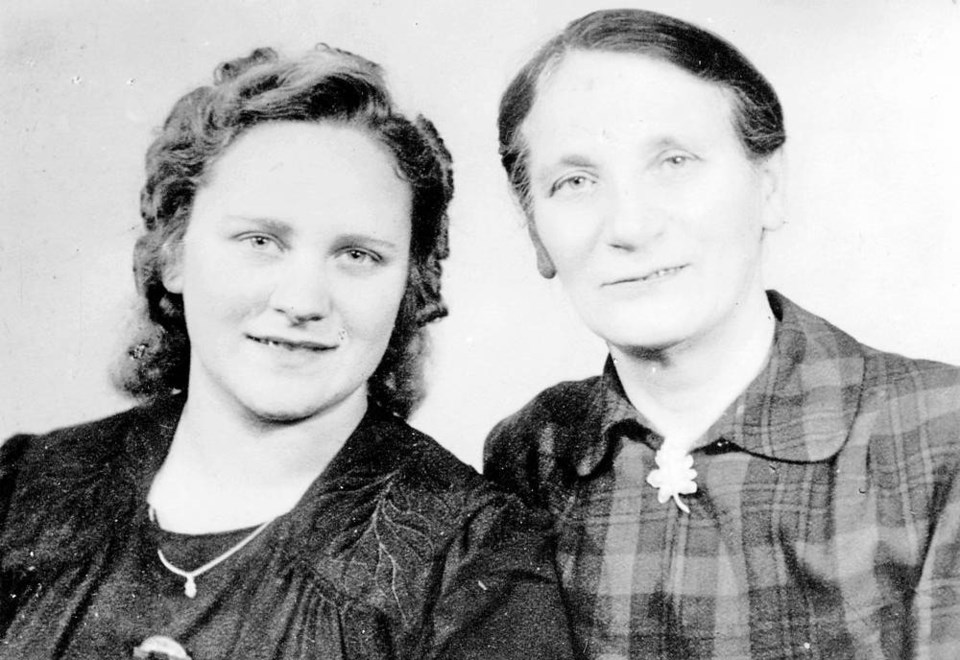My wonderful relative Alice turned 93 a few weeks ago, and because of COVID-19, only one family member was allowed to help her celebrate. That same daughter was with Alice again, briefly and carefully, on Christmas Day.
Alice is my mother’s cousin, the last of her generation, a survivor, and a great reality check, because she knows what true suffering is like.
She came to Canada as a refugee in the early 1950s. Finally, after years of running, of hiding, of fearing for her life, this country gave her safety and security.
As a refugee, she knows that she owes her life to Canada. The last thing she would do, or ask me to do, is undermine the efforts of the health authorities in fighting this pandemic.
So I might never see her again.
Alice was born in the Soviet Union, the year before my grandparents (and my mother) escaped. After seizing private farms, the Communists took much of the food produced in my ancestral village, forcing hunger upon the people.
By the time Alice was 10, conditions were much worse. Several men and women from the area were arrested and tried, usually for being opposed to the Communist regime, then sent to labour camps or simply shot.
I’ve been through the files in the Zhitomir archives. It’s not easy learning how your relatives were murdered. Two of my mother’s uncles took bullets two minutes apart. Newlyweds were arrested on their wedding night. And so on.
Alice’s father was the last one arrested in that village, and she never knew his fate until I dug deep in the archives. He was tried, sent to a labour camp, and after that, who knows. “At least he wasn’t shot,” Alice said when I told her.
During the war, most of the people in her village fled west into German-occupied Poland. Most of the villagers believed the Nazis would be kinder than the Communists had been.
A few years ago, I asked Alice when she found out about the Holocaust.
“When I saw it,” she said. She was on a refugee train that was stopped in East Prussia in January 1945. German soldiers came through and covered all the windows with plywood. But Alice heard screaming and shooting, so she peeked through a crack in the wood.
She saw Jewish men in a field. Being shot. She told me they were desperately thin, as if they had been starved for quite some time. But still they fought, they resisted, they tried to run, they tried to save their lives.
Alice saw the slaughter. She was 16. If the Nazis had realized that she was a witness, they would have shot her, too.
The war ended a few months later. Alice and her mother and grandmother were in the Soviet zone of Germany, and knew they would have to get to the West, past the Soviet and East German guards.
Late one night, Alice ran across a field to freedom. When I asked her how she knew it was safe to cross, she said she would listen for the sound of gunfire. If it was distant, that meant the border patrol was busy elsewhere. She crossed that border five times in all. After she found the safe route, she went back for her mother, and then for her grandmother.
After a few years in West Germany, she arrived on the Beaverbrae as a refugee, a Displaced Person.
I try to visit Alice twice a year, but it’s not easy. She is in Winnipeg, and I am here. I saw her for what might be the last time just four days before the pandemic was declared.
I want to visit her again, and she wants to see me, but that visit might never happen. It would be wrong for me to go to Winnipeg now, and it will be wrong for many months to come.
I can’t visit relatives who live a 10-minute walk from me. Bubbles matter these days, at least to those of us who care about each other.
A trip to Winnipeg would put me in three airports, and in two airplanes, each way. I don’t want to pick up or spread the virus in an airport or an airplane. I do not want to carry the COVID-19 virus into Alice’s home, and I do not want to bring it back to Victoria.
Yes, I could wear a mask, keep my distance, and wash my hands until they are raw – but there would still be risk, a risk that a responsible person would not take.
At least Alice is rolling with the flow. Lockdowns? Travel restrictions? She has seen worse, much worse. She says my next visit can wait until this is over. Until then, we both have telephones.
Everyone has friends or relatives we are anxious to see again. But most of us are making sacrifices for the greater good, a concept that a few elected officials fail to understand.
Their actions are insulting, disrespectful and irresponsible, and their attempts to justify themselves disgraceful and at times dishonest.
Election to public office does not put a person above all others – especially when it comes to a health emergency.
When so many of us are doing without, it’s no wonder that Canadians are furious over those who believe their elected office grants them immunity from responsibility.
As a refugee, Alice is committed to Canada and Canadians. It’s too bad that a few politicians do not share her values.



